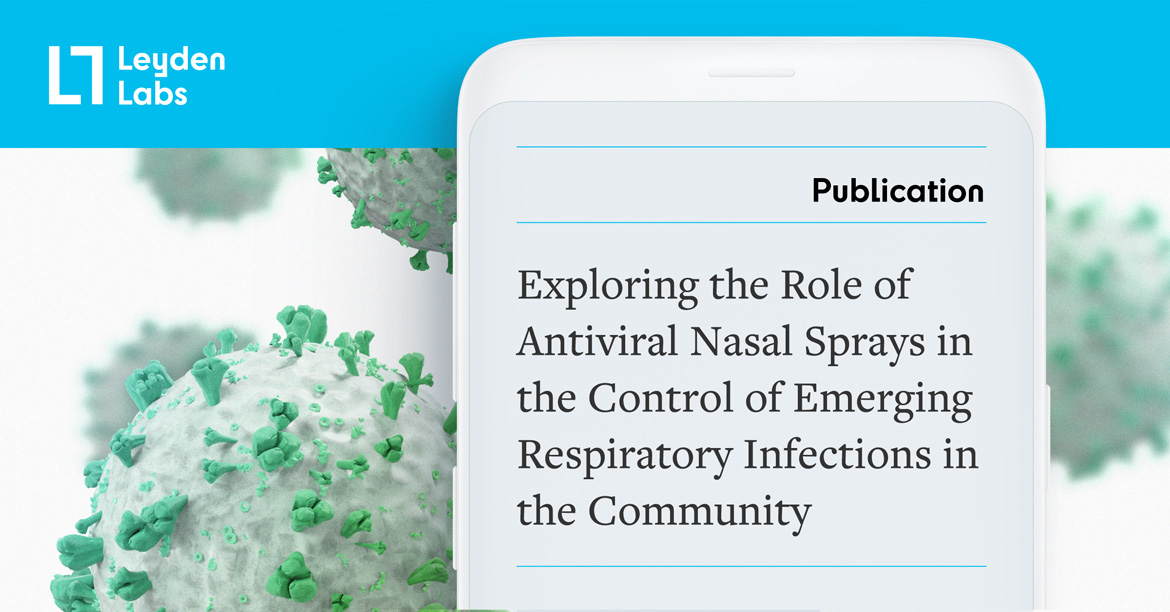
October 30, 2022
Population modeling reveals impact of antibody nasal sprays on new viruses like SARS-CoV-2
A new research article by Leyden Labs and partners at Imperial College has been published in Infectious Diseases & Therapy. The article is entitled “Exploring the Role of Antiviral Nasal Sprays in the Control of Emerging Respiratory Infections in the Community.” Read it here.
The COVID-19 pandemic has unveiled a gap in our measures for pandemic preparedness: we need fast-acting protection against infection from known and new viruses. Intranasal sprays with antivirals that provide immediate, broad protection against a family of viruses could potentially fill this gap. They could be used for passive immunization, which is not dependent on the recipient’s immune response and hence would have high efficacy even in the elderly and immunocompromised.
Our team collaborated with leading epidemiologists – including Dr. Chris Hadjichrysanthou, Prof. Frank de Wolf and Prof. Sir Roy Anderson – to develop a mathematical model studying the impact of antibody nasal sprays on the control of new viruses like SARS-CoV-2. The purpose of the analysis was to gain an understanding of the impact of antiviral intranasal sprays on a pandemic: could such products change the course of a pandemic, and if so, on what scale and at what timing should the intranasal sprays be used in a community?
The team modelled thousands of scenarios of the outbreak of the COVID-19 pandemic and effects of intranasal sprays with different modes of action. The findings show that antiviral intranasal sprays could delay the spread of the infection and reduce the proportion of hospitalizations significantly. This effect was shown over the range of transmissibility, from the Wuhan variant to the much more transmissible Omicron variant. And within smaller groups, for example nursing home residents or a household in self-isolation, intranasal sprays could eliminate the virus locally.
Speedy roll-out of the intervention, in the first two months of the pandemic, would be important. The proportion of hospitalizations averted would further depend on the treatment efficacy, the duration of use, and the proportion of treated people in the population. Intranasal sprays that prevent infection were most effective at delaying the spread of the virus. Intranasal sprays that prevent severe disease are most useful if people at risk of severe disease are identifiable (e.g. the elderly or the immunocompromised).
The work of our team of epidemiologists show that the characteristics of intranasal sprays are not the only factor in pandemic prevention. Virus characteristics play a role: how fast does a virus spread, how lethal is it, and how long do people shed the virus? Furthermore, our behavior and governmental interventions play a role: what is the delay between discovery of a new virus and usage of intranasal sprays? How many people use the intranasal sprays and for how long? All these variables are important as we look to control future emerging respiratory infections.
OUR NEW APPROACH | OUR TEAM | JOIN OUR MISSION | NEWS | CAREERS
Leyden Laboratories B.V.
Leiden Laboratory
Emmy Noetherweg 2
2333 BK Leiden
The Netherlands
Leyden Labs Asia Pte. Ltd.
79 Science Park Drive
#04-05, Cintech IV
Singapore 118264
© Leyden Labs, 2023 | Privacy Statement | Design by Ape to Zebra